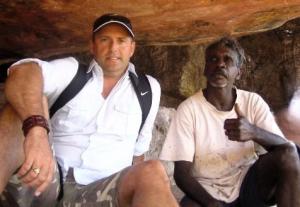New Historical Novel Outback Odyssey Gains Global Attention While Sparking Silence at Home
Paul Rushworth-Brown’s Outback Odyssey Earns International Acclaim for Its Allegorical Portrayal of Australia’s Colonial Past
SYDNEY, NEW SOUTH WALES, AUSTRALIA, August 8, 2025 /EINPresswire.com/ -- On the International Day of the World’s Indigenous Peoples, a historical novel out of Australia is doing what few books dare: confronting the silence that still surrounds colonisation, Aboriginal culture, and national identity.
Outback Odyssey, the new novel by English-born Australian author Paul Rushworth-Brown, is gaining international recognition — from the UK to the US — for its unflinching exploration of cultural erasure, Indigenous resilience, and spiritual belonging in a fractured land.
“It’s about more than one country’s past,” says Rushworth-Brown. “It’s about what happens when we stop listening — and what begins to heal when we finally do.”
A Story Too Honest for Some
Set in 1950s Australia, Outback Odyssey follows a young Yorkshire migrant who, after a childhood in an orphanage, is cast adrift in the remote bush. Taken under the guidance of a First Nations Elder named Jarrah, the boy’s journey becomes one of cultural immersion, spiritual reckoning, and quiet belonging — not to ownership, but to understanding.
This isn’t just historical fiction. It’s an allegory. And that makes it harder to dismiss.
“So many books set on Aboriginal land never ask what that land remembers,” Rushworth-Brown says. “This one does.”
“I’m not trying to preach,” he says. “I just wrote a story that hopefully urges people to think. I believe we need to grow — not in power, but in empathy. We’ve got to become better at being human.”
Global Praise. Local Silence.
Outback Odyssey has been featured on the UK podcast Conversations Allowed, America’s Jazz for Peace, America Tonight with Kate Delaney, and picked up by The Associated Press. It’s been applauded for its allegorical depth — a novel that, as one Indigenous educator said, “sits with us, not over us. That’s rare. And it matters.”
And yet, back home in Australia?
Silence. With the exception of Ngaarda Media, a First Nations broadcaster, the novel has been ignored by the mainstream literary press — a void that mirrors the story’s deeper themes.
“It’s not just a novel,” says literary analyst Amanda Smith. “It’s a mirror. And mirrors make people flinch when they’re not ready.”
From Page to Screen
Award-winning Swedish director Carl Svensson — known for Young Wallander, Pappa Parkinson and En svensk tiger — is currently in early talks with Rushworth-Brown about a screen adaptation that stays true to the book’s emotional and cultural weight.
A Life Written Between the Lines
Rushworth-Brown is no stranger to being erased. As former head coach of the Australian Paralympic Football Team — a team he helped name and lead for over a decade — he was removed from its official history after speaking out when the Australian Sports Commission attempted to shut the program down.
That experience of institutional silence echoes through Outback Odyssey — a story built on truths Australia often struggles to face.
“Truth-telling costs something,” he says. “But silence costs more.”
Why It Matters — and Why It’s Timely
Released during a global reckoning on Indigenous rights, Outback Odyssey is a wake-up call dressed in fiction. Its allegorical message resonates with Indigenous struggles across continents — from Turtle Island to Aotearoa. And it asks something simple, but urgent:
“Can we grow — not just as economies, but as people?”
As the world marks the International Day of the World’s Indigenous Peoples, Outback Odyssey isn’t just part of the conversation. It’s starting the one many still try to avoid.
🎧 Listen to the Author Interview on Conversations Allowed
https://youtu.be/CGHOBTzkyM0
📘 Learn More about the Book
https://bit.ly/43P4noC
Media Contact
Hayley Brown
Publicist
(for interviews)
📧 hayleybrownpa@gmail.com
Publisher Historium Press
Dee Marley
(912) 577-7407.
Author Contact
Paul Rushworth-Brown
📞 +61 431 724 652
World Books
World Book Publishing Industry
+61 431 724 652
hayleybrownpa@gmail.com
Visit us on social media:
LinkedIn
Bluesky
Instagram
Facebook
YouTube
TikTok
X
Other
Colonisation, Culture, and the Cost of Silence — Paul Rushworth-Brown Speaks
Legal Disclaimer:
EIN Presswire provides this news content "as is" without warranty of any kind. We do not accept any responsibility or liability for the accuracy, content, images, videos, licenses, completeness, legality, or reliability of the information contained in this article. If you have any complaints or copyright issues related to this article, kindly contact the author above.



